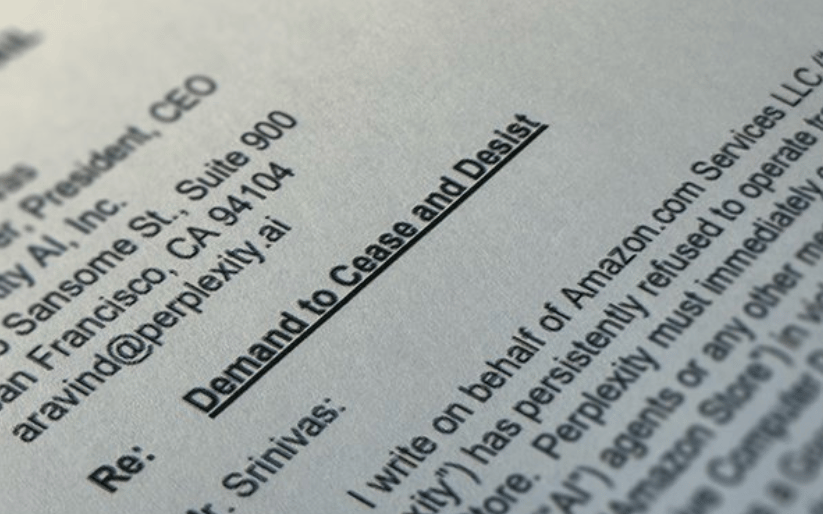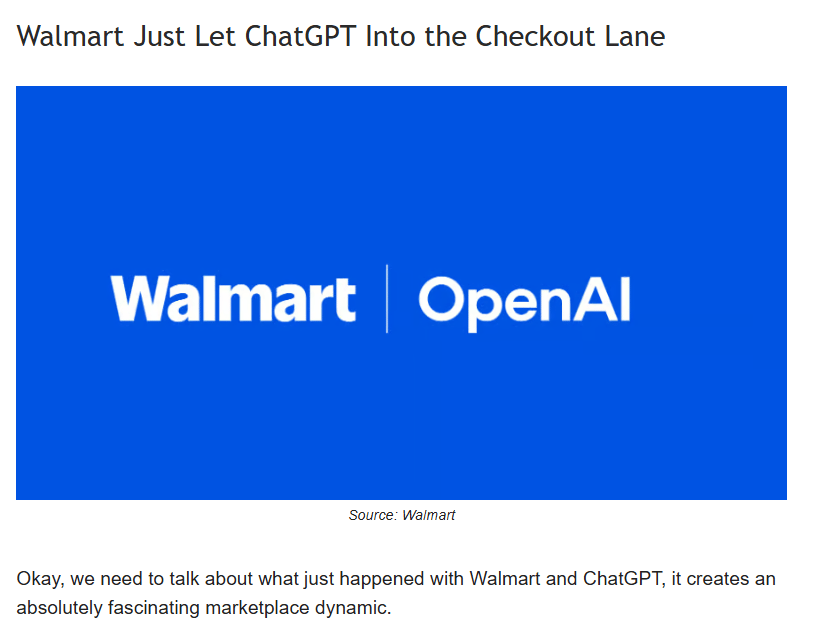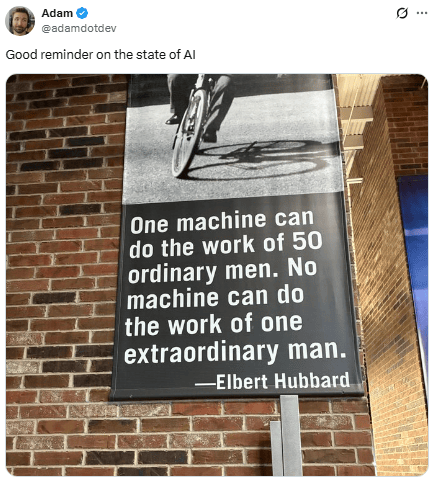- AI for Ecommerce and Amazon Sellers
- Posts
- The $50 billion reason Amazon's terrified of shopping bots
The $50 billion reason Amazon's terrified of shopping bots
A deep-dive on Amazon vs the AI Agents

Don’t Miss This:
⚡ 16 Badass Amazon hackers are gathering for a badass showdown!
Each speaker will share a hack in 5 mins! Let's see … WHO is the BEST OF THE BEST!
Some of the hacks covered:
Break the Amazon Image Rules While You Can
AEO Hack: How to Make ChatGPT Your Brand Ambassador!
Nuke Fake Reviews Fast!Here’s how to find and flag them fast using the Amazon Review Checker. No guessing, just data!
How to Leverage Your Customer Emails to Follow People on Amazon!
And more…
The $50 billion reason Amazon's terrified of shopping bots

The latest juicy conversation happening in Amazon and e-commerce circles right now? Perplexity just got slapped with a cease-and-desist letter from Amazon.
And look, this isn't just corporate drama. What we're seeing is the e-commerce world splitting into two camps: the "AI bots welcome" crowd and the "absolutely not, get out" faction (population: Amazon). It's like watching a high-stakes game of retail chess where everyone's choosing sides, and the stakes are basically the future of how we shop online.
So let me break down where we are, why Amazon's going full fortress mode, and what this means for literally anyone selling anything on the internet.
The Great Shopping Bot Blockade of 2025
Here's what went down: In early November, Amazon basically told Perplexity's Comet shopping agent to get the hell off their lawn. They're claiming this AI bot is sneaking around disguised as a regular user, making unauthorized purchases, and generally being the digital equivalent of that friend who shows up uninvited to your party and starts rearranging your furniture.
But here's where it gets juicy—and why I've been obsessively refreshing tech news sites like a teenager waiting for concert tickets to drop. While Amazon's building walls higher than my anxiety levels during Black Friday, Walmart, Shopify, and Etsy are literally throwing open their doors to these same AI agents.
It's like watching one store hire security guards to tackle anyone with a shopping assistant while the store across the street is handing out "AI Shoppers Welcome" signs. The cognitive dissonance is chef's kiss.
Amazon's Multi-Front War (Or: How to Be Paranoid in Style)
Amazon isn't just sending angry letters (though that would be entertaining enough). They've gone full fortress mode. Back in August, they updated their robots.txt file—basically the internet's "Keep Out" sign—to specifically block AI crawlers from Perplexity, Claude, and others.
Then they got creative. They started triggering errors whenever these bots tried to access product pages. It's like they hired a bouncer for every single product listing. As someone who once spent six hours trying to bypass my own forgotten password, I have to admire the pettiness.
The November legal threat took things to DEFCON 1. Amazon's essentially accusing Perplexity of being the digital equivalent of wearing a fake mustache to sneak into a members-only club. They're throwing around terms like "computer fraud statutes," which sounds serious enough to make even my lawyer friends put down their martinis.
(Side note: Remember when Cloudflare called out Perplexity in August for allegedly sneaking past blocked sites by rotating IP addresses? Yeah, Perplexity's been playing fast and loose with the rules for a while. It's giving "kid who always found loopholes in classroom rules" energy.)

Source: testingcatalog
Meanwhile, Across the Retail Universe...
Now, if you've been following this newsletter (and bless you if you have), you already know about the other camp. Remember when I wrote about Walmart announcing in October that you can shop their entire catalog through ChatGPT? Or Etsy jumping on board? Or Shopify pledging to bring their entire merchant ecosystem along?
Yeah, while Amazon's building higher walls, these companies are basically rolling out the red carpet for AI agents. It's like watching the retail equivalent of choosing sides for dodgeball, except one team is actively recruiting players while Amazon's standing alone insisting everyone should play by the old rules.
The contrast still gives me whiplash every time I think about it. Half the retail world is treating AI agents like the hot new distribution channel they need to capture, while Amazon's over here filing restraining orders.
The Real Reason Amazon's Freaking Out
Here's what's actually keeping Jeff Bezos's successor up at night (probably): It's not about the bots. It's about who owns the "customer relationship"—that crucial first moment when someone decides what to buy.
Amazon has spent literally billions—BILLIONS with a B—building the world's most sophisticated "you might also like" machine. Their recommendation engine is so good it knows I need paper towels before I do. (Seriously, it's creepy but convenient.) But when you ask ChatGPT to find you a coffee maker? The interface literally owns the customer now. ChatGPT becomes the gatekeeper, deciding which products to show based on its own logic, not Amazon's carefully crafted algorithm refined across hundreds of millions of purchases.
This is what industry insiders are calling the shift from first-party to third-party power. If assistants become the dominant shopping interface, whoever controls that assistant controls commerce. Amazon gets this—which is why they're building their own agents while blocking everyone else's. Classic "I want to be the only one at the party" energy.
For companies like Walmart and Shopify, the calculation is completely different. They're not sitting on the Iron Throne of e-commerce. They don't have Amazon's mind-reading recommendation engine or its massive built-in traffic. So partnering with ChatGPT through things like Instant Checkout is their shot at capturing what analysts are calling "the voice of the buyer." They're willing to trade some control for distribution inside the assistant because, frankly, what control did they really have when Amazon dominates 40% of e-commerce anyway?
The $50 Billion Advertising Problem Nobody's Talking About
Okay, here's where things get genuinely fascinating (and I promise I'm not just saying that because I've been staring at spreadsheets for too long). Amazon's retail media business—you know, those sponsored listings that somehow always show up first—generated over $50 billion last year. That's not just advertising; it's one of the fastest-growing segments in all of retail.
Fifty. Billion. Dollars.
That entire business model depends on Amazon controlling the discovery surface where placement and promoted listings happen. But AI agents? They don't care about sponsored placements. They're like that friend who actually reads Consumer Reports before buying anything—optimizing for pure relevance, not what paid to be there.
Industry analysts are calling this the retail media reckoning. If AI agents become how we shop, Amazon's advertising goldmine turns into a very expensive pile of worthless pixels. The platform that monetizes every pixel of screen real estate suddenly has no screen to monetize.
Meanwhile, Walmart's retail media business, while growing explosively (up 28% year-over-year), isn't their primary profit engine like it is for Amazon. They can afford to experiment with new distribution models that might cannibalize some ad revenue because they're still fundamentally a retailer, not an advertising platform masquerading as one. Same goes for Etsy and Shopify—they're willing to trade placement control for what could be massive new customer acquisition channels.
What This Mess Means for Anyone Selling Online
If you're selling on multiple platforms (and honestly, who isn't these days?), this split is about to fundamentally reshape your business. Your products on Shopify could be getting discovered by ChatGPT users while your identical Amazon listings are invisible to AI shoppers.
Here's where it gets really interesting for independent sellers: Those using Shopify or Etsy might actually gain a distribution advantage for the first time in years. While Amazon-dependent sellers have to play by Amazon's retail media rules (pay to play, basically), the Shopify crowd gets organic discovery through AI assistants. It's like the algorithm finally stopped playing favorites.
But there's a catch (because there's always a catch). You'll need to optimize for completely different worlds:
Amazon's traditional search with its pay-for-placement economics
AI agent discovery where structured product data and actual quality might matter again
Whatever hybrid Frankenstein models emerge from this chaos
The telemetry alone is going to be a nightmare. AI agents mess with everything—your A/B testing, conversion tracking, even basic traffic analytics. One day your conversion rate tanks and you're pulling your hair out until you realize it's just bots doing reconnaissance missions for future purchases.
For Amazon-only sellers, this is your five-alarm wake-up call. Being locked out of AI-accessible platforms could mean missing what McKinsey's calling the next major shift in commerce architecture. Time to diversify before you become the Blockbuster of e-commerce sellers.
The Billion-Dollar Question (With Regulatory Spice)
What we're really watching is a fight over the future architecture of online shopping. Will we keep the current model where platforms control everything from discovery to delivery? Or are we moving to a world where AI agents become neutral intermediaries, and platforms have to actually compete on things like price and service?
And thought to self…is neutral really neutral or is it just shifting the main player in the tech power bingo?
Here's where it gets juicy: Regulators are already sniffing around this whole mess. If Amazon selectively blocks third-party agents while pushing their own, that's potentially anti-competitive behavior that makes their recent antitrust troubles look like a warm-up act. The Perplexity legal fight might become the test case that determines whether "security concerns" are a valid reason to block competitors or just convenient cover for protecting market dominance.
The platforms that help set the new standards—those delegation protocols, spend policies, and privacy-preserving tokens everyone's talking about—will essentially write the rules for the next era of commerce.
Amazon's betting that customer habits, Prime addiction, and two-day shipping create enough lock-in to preserve the old model. Walmart and friends are betting that being early to the agent party matters more than controlling the venue. They're gambling that redistributing power from marketplaces to agent platforms is inevitable, so they might as well get the best seat at the new table.
The Bottom Line (Because I Need Sleep)
This isn't just corporate drama. It's possibly the biggest shift in how we shop online since someone figured out you could put a "Buy Now" button on a website.
Amazon's aggressive blocking strategy might work. Maybe we're all too lazy to change our shopping habits. Maybe Prime membership is the modern equivalent of Stockholm syndrome. Or maybe—just maybe—we're watching Amazon make the same mistake Blockbuster made when they laughed at Netflix.
The next 18 months will tell us whether AI shopping agents are the future or just another tech trend that sounds revolutionary at 3 AM when you've had too much coffee. Either way, I'll be here, obsessively tracking every development and probably developing an unhealthy attachment to retail earnings calls.
Now if you'll excuse me, I need to go check if my Amazon recommendations have become sentient yet. They keep suggesting things I actually need, and frankly, it's unsettling.
From Our Sponsor:
Shoppers are adding to cart for the holidays
Over the next year, Roku predicts that 100% of the streaming audience will see ads. For growth marketers in 2026, CTV will remain an important “safe space” as AI creates widespread disruption in the search and social channels. Plus, easier access to self-serve CTV ad buying tools and targeting options will lead to a surge in locally-targeted streaming campaigns.
Read our guide to find out why growth marketers should make sure CTV is part of their 2026 media mix.
Do You Love The AI For Ecommerce Sellers Newsletter?
You can help us!
Spread the word to your colleagues or friends who you think would benefit from our weekly insights 🙂 Simply forward this issue.
In addition, we are open to sponsorships. We have more than 53,000 subscribers with 75% of our readers based in the US. To get our rate card and more info, email us at [email protected]
The Quick Read:
Sephora and Condé Nast are redefining beauty retail with creator storefronts
How Real Artists and Designers Can Thrive in the Age of AI Sludge
Ahrefs’ new MCP server lets you chat with SEO data via ChatGPT or Claude, automating keyword and competitor insights at scale.
Marketing jobs are tightening, but growth and product roles tied to revenue still thrive, making commercial skills more important than ever.
Perplexity’s Comet browser fights prompt injection with real-time detection, guardrails, and user control for safer AI actions.
A Historical Take on the AI Boom
Claude for Excel now reads, explains, and edits full spreadsheets, turning formulas into clear, conversational insights.
Anthropic bets on B2B over hype, building a steadier enterprise first model while OpenAI chases scale.
Let’s just keep this one in mind:
Pinterest upgrades boards with AI powered styling and curated, shoppable looks tailored to each user.
The Tools List:
🧠 Antispace - An AI tool that transforms thoughts into actions.
🎨 Design Buddy - Catch every design flaw, before it’s too late.
🔍 Search+ - Chat with any PDF documents
📹 Revid - Stunning product videos in minutes.
🗨️ ChatGPT Sugar - Enrich your daily interactions with ChatGPT
About The Writer:

Jo Lambadjieva is an entrepreneur and AI expert in the e-commerce industry. She is the founder and CEO of Amazing Wave, an agency specializing in AI-driven solutions for e-commerce businesses. With over 13 years of experience in digital marketing, agency work, and e-commerce, Joanna has established herself as a thought leader in integrating AI technologies for business growth.
For Team and Agency AI training book an intro call here.




